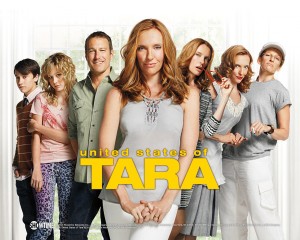
Toni Collette as Tara and some — but not all — of her alter egos. Courtesy of 3-b-s.eu
To say that “United States of Tara” is the best dark comedy show on air right now would be an understatment. It might be one of the best in TV history. I’m glad it’s back to grace us with a third season, then!
The Showtime brainchild of Diablo Cody (best known for writing “Juno”) and Steven Spielberg is able to delve into a myriad of subjects that are often taboo on network channels, making for an absolutely gripping and controversial 30 minutes every Monday. At the epicenter of this is the Gregson family of Kansas, who together handle topics like suicide, abuse, homosexuality, alcoholism and adultery. All of this, however, is merely the backdrop for the real center of attention: mother Tara’s (Golden Globe-winner Toni Collette) battle with Disassociative Identity Disorder and her six alter egos (which the family refers to as “alters”).
While some shows might use these hot topics as gimmicks and may over-simplify them into clichéd media stereotypes, “United States of Tara” handles its plot with care and attention to detail, making it the only show I’ve ever watched in which a family believably grapples with a horde of obstacles.
When we last saw the Gregsons at the end of season two, Tara’s many alter egos seemed to have finally fused back into one, but ultimately come out again, this time adding another alter. As for the rest of the family, Tara’s pregnant sister, Charmaine (Rosemarie DeWitt), had been left at the alter; her teenage daughter, Kate (Brie Larson), was coming out of a desperate side career in soft porn; her gay son, Marshall (Keir Gilchrist), was entering into his first real relationship and Tara’s husband, Max (John Corbett), continued to offer seemingly never-ending support for the entire family.
So far, the focus of this season is Tara’s return to college to finish a degree she stopped many years ago after her alters tried to make her commit suicide. Although Tara believes in her ability to remain Tara while at college, after one day in abnormal psychology she goes through one of the many transitions that have already occurred this season.
Ironically, the alter who shows herself in class is Shoshana Schoenbaum, an overconfident New York therapist who waltzes up to the front of the class and tries to take over. Needless to say, the professor isn’t terribly fond of this, and neither is Tara once she transitions back into herself and is left awkwardly standing before an assembly hall of her peers, unsure of how she got there.
As Tara struggles to find her place in returning to academia, the rest of the clan continues to evolve with the show, facing more advanced versions of their obstacles from previous seasons. Charmaine panics about the impending birth of her illegitimate child and partakes in an emotional, on-again off-again relationship with the baby’s father; Marshall begins to question whether he and his boyfriend are together out of legitimate attraction to each other or because of sheer numbers in the face of scant openly gay adolescents in Kansas; Kate makes plans to finally get her life together and move to Japan to teach English and Max, in a pit of financial doom, sells his landscaping company to “the big guys,” leaving his best friend and the father of Charmaine’s baby jobless.
All this after only two episodes, and the season is clearly shaping up to be an enthralling one. Collete’s amazing ability to master all of the intricacies of Tara’s alters stays strong this season too — while most actors are responsible for embodying one character, she juggles six, who vary in age, attitude, gender and type of American accent, even the last of which she nails perfectly, despite being Australian. If you’ve never watched this show before, get your computer, catch the fuck up and prepare to be obsessed. Your life will never be the same.
Sklar is a member of the class of 2014.
